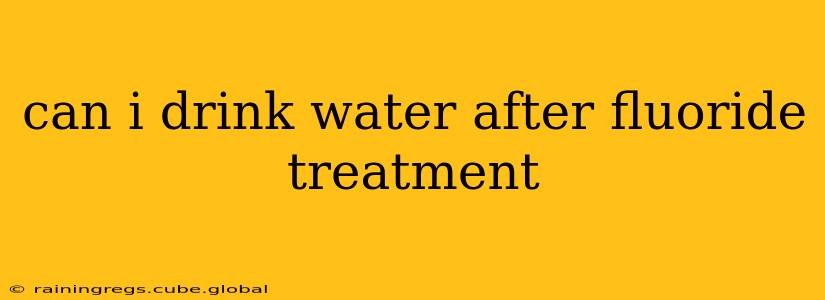Fluoride treatments, whether professional applications at the dentist's office or through at-home methods, are crucial for maintaining strong, healthy teeth. A common question many patients have is about drinking water afterward. The simple answer is yes, you can drink water after a fluoride treatment, but there are nuances to consider depending on the type of treatment you've received. Let's explore this in detail.
What Happens During a Fluoride Treatment?
Fluoride treatments involve applying a concentrated fluoride solution to the teeth. This strengthens tooth enamel, making it more resistant to acid attacks from bacteria and sugars that cause cavities. The fluoride works by integrating into the enamel's structure, hardening it and making it less susceptible to decay.
There are several types of fluoride treatments:
- Professional in-office treatments: These are typically gel or foam applications administered by a dentist or hygienist. They often involve a tray that holds the fluoride solution against your teeth for a specific period.
- At-home treatments: These can include fluoride mouthwashes, toothpastes with added fluoride, or custom-fitted trays containing fluoride gel that you use at home.
Can I Drink Water Immediately After a Professional Fluoride Treatment?
Yes, you can generally drink water immediately after a professional fluoride treatment. However, it's crucial to avoid rinsing, spitting, or eating for at least 30 minutes afterward. This allows the fluoride solution to fully penetrate the tooth enamel and achieve maximum effectiveness. Drinking water is acceptable within this timeframe as it won't significantly affect the treatment's efficacy. However, avoid anything that could dilute or wash away the fluoride gel.
What About Other Drinks and Food After Fluoride Treatment?
The 30-minute waiting period applies to food and drinks other than water as well. Avoid eating, drinking anything besides plain water, smoking, or using mouthwash for at least 30 minutes following your treatment. This ensures the fluoride has sufficient time to work its magic.
What If I Accidentally Rinse or Eat Too Soon?
If you accidentally rinse or eat too soon after your treatment, it's not a major catastrophe. Some of the fluoride will still have been absorbed by your teeth. However, the effectiveness might be slightly reduced. Don't be overly concerned, but try to follow the dentist's instructions as closely as possible for optimal results.
Does it Matter What Kind of Water I Drink?
The type of water you drink immediately after treatment is less important than following the waiting period. Plain water is best. Avoid sugary drinks or acidic juices as these could negate some of the benefits of the treatment.
What About At-Home Fluoride Treatments?
The recommendations for at-home fluoride treatments generally follow similar guidelines. Check the specific instructions on your product. Usually, you'll need to refrain from rinsing or eating for a specified time after application. This time frame may be shorter than the 30 minutes for professional treatments, but always adhere to the instructions provided with the product.
How Often Should I Get Fluoride Treatments?
The frequency of fluoride treatments varies based on individual needs and risk factors. Your dentist will recommend a schedule based on your oral health and overall health. Regular checkups and cleanings are key to maintaining optimal oral health.
Are There Any Side Effects of Fluoride Treatments?
Generally, fluoride treatments are safe and have minimal side effects. Some patients may experience temporary mild tingling or sensitivity to their teeth immediately after treatment, but this usually subsides quickly.
In conclusion, drinking water after a fluoride treatment is generally fine, provided you adhere to the dentist's instructions regarding the waiting period before rinsing, eating, or drinking anything other than plain water. Always consult your dentist or dental hygienist for personalized advice and guidance on fluoride treatments and optimal oral hygiene practices.
